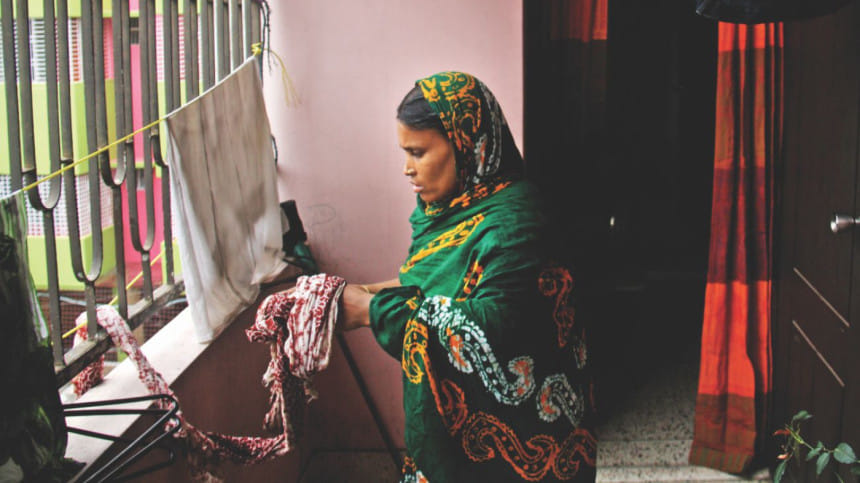HUMILIATED AND INSULTED

Rina Akther, a 16 year-old domestic worker begins her day at the break of dawn. She has been working in the same house in Niketon for the last six months and has never received a day off since the beginning of her employment. "Before working here I worked at a house in Dhanmondi," she says. "The employer used to beat me every day for the smallest mistakes. At least, here my employer does not act that way."
|
THE STATE OF DOMESTIC WORKERS IN NUMBERS |
| 50 percent of domestic workers are children aged 5-15 years. 76.67 percent of all domestic workers are women. 50.8 percent of the domestic workers have never attended school. 40 percent workers have primary level education. 100 percent of these workers claim that there is no formal or written agreement with the employer. 10.73 hours: domestic workers work on an average per day. 63.33 percent do not get any leave from their employers. 13.33 percent domestic workers enjoy regular leave. 53.3 percent do not get their wages after the completion of their wage period. |
According to the International Labour Organisation (ILO), domestic work is the earliest form of employment for millions of women around the world. However, they remain outside the protection of a legal framework in Bangladesh. The sad part is, the only existing law "Domestic Servants' Registration Ordinance, 1961" was ignored during the enforcement of the Labour Law in 2006.
In absence of legal direction and appropriate laws, workers are hired at cheaper rates and often abused. Rina gets Tk 1500 per month but works for around 12 hours every day. According to the Bangladesh Institute of Labour Studies (BILS), a labour rights organisation, 398 workers were brutally killed between 2011 and 2014. In addition, 399 workers were physically abused and tortured.
Well-educated upper and middle class families cannot avoid the responsibility of not taking any positive steps to change the existing situation. Mostafiz Ahmed, an associate professor of Social Work Department, Jagannath University, writes in his research paper, 'Organising Domestic Workers in Bangladesh', that the mindset of law-makers and policy-makers toward domestic workers and the less organised nature of the labour force are the two most important reasons behind exclusion of these workers from the existing labour law.
His research further states that most employers believe that domestic workers working at homes have a better life than they would have if they remained in their respected villages - a way to justify their actions. Bangladesh had begun to work on a national policy for domestic workers three years back. The draft policy is yet to be finalised and it might take a few more months to come into light. Even though activists appreciate the initiative, they also criticise the government for erasing important points like registration and minimum wage.
However, a legal framework alone cannot bring about a change in this situation unless there is a mass campaign in favour of domestic workers across the country. Besides building a legal framework, the government should start working with labour rights activists to change people's attitude toward domestic workers.

 For all latest news, follow The Daily Star's Google News channel.
For all latest news, follow The Daily Star's Google News channel. 



Comments